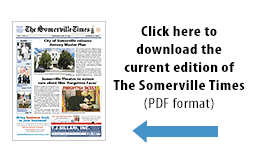
State Rep. Carl Sciortino's bill, known as the Clawback bill, is a three-part reform of corporate tax breaks and expenditures in Massachusetts, estimated to be valued at $2.2 billion. ~Photo by Andrew Firestone
By Andrew Firestone
Fellow delegates joined Somerville Representative Carl Sciortino this week in front of the Joint Committee of Revenue. Along with co-author Senator Jamie Eldridge, Sciortino presented the “Act to Promote Efficiency and Transparency in Economic Development” for approval.
Sciortino’s bill, known as the “Clawback bill”, is a three-part reform of corporate tax breaks and expenditures in Massachusetts, estimated to be valued at $2.2 billion by State Auditor Suzanne Bump.
The first part called for transparency for the accounts of companies benefiting from tax breaks. “Companies must maintain information on how many jobs are actually created, the salary and benefit amounts of these jobs, and the cost of the subsidy to the taxpayers,” said Sciortino.
The second reform “sets minimum standards by capping the subsidy at $35,000 per permanent full-time job,” said Sciortino, adding that the wages must remain “above 85 percent of the average wage for the industry or region, 75 percent for small businesses.”
The third provision, or the “clawback” provision was the toughest and most far-reaching. “A company has two years to fill its job creation commitment;” said Sciortino. “The state recaptures a pro-rated portion of the subsidy if it is not met at the two year mark.
“If 90 percent of the goal is not met within three years, the entire subsidy is recaptured.”
“This bill increases the efficiency of a state’s economic development agencies by making them transparent,” said co-sponsor Eldridge, an Acton Democrat. “If a company promises to create a certain number of jobs for subsidy and they fail, we should get our money back, it’s that simple.”
Sciortino was also joined by some of the many lawmakers who supported the bill, including Somerville Senator Pat Jehlen, Lincoln Senator Susan Fargo, and Boston Senator Sonia Chiang-Diaz.
“We owe it to our constituents to be shrewd negotiators, to be tough at the bargaining table,” said Chiang Diaz. “Shame on us as policymakers if we rely on guesswork whether the things we’re spending money on are working.”
The current situation was brought home by Bump, who gave testimony over what she says is the wildly under-scrutinized tax-cut system, which saw the loss of millions in taxpayer subsidies this year after heavily subsidized companies Evergreen Solar and Fidelity Investments both moved their MA campuses, costing the state millions.
“Once a tax break gets passed, it goes into a black box and seldom, if ever, does anyone look back and determine whether it is working as intended or whether there is continued public benefit,” said Bump.
Bump said that, in the last five years alone, the tax expenditure budget has risen by $5.1 billion. This is more than twice the budget shortfall for the 2012 fiscal year.
The legislation goes a long way toward organizing a uniform system of review for these tax breaks, which was a sigh of relief for Rep. Jay Kaufman, Chairman of the Joint Committee and Democrat of Lexington.
“These goals definitely help us move in the direction of clarity, and I think there will be sentiment to take these next steps,” said Kaufman.
“Bottom line here is that we the taxpayers are supporting all sorts of enterprises and supporting all sorts of programs without any clear sense of what kind of return we are getting on our investments,” said Kaufman. “That’s not a very smart way of doing business.”
If approved by committee, the bill will go forward to be debated in State Congress.















Reader Comments